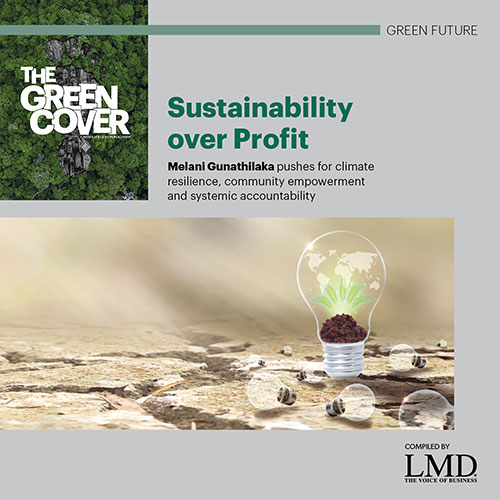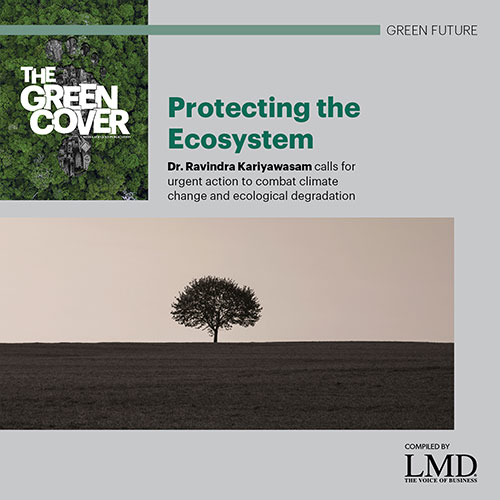CORPORATE ACTIONS FOR CLIMATE CHANGE
Sustainable Environmentalism
Passionate scientists, and leaders such as Carl Sagan and Al Gore, have conjured the spectre of climate change and its potential harmful impacts from as far back as 1985. Since then, much has been written and said about the need for a mindset change and immediate attention to sustainable environmentalism… but we are where we are today: with a hot planet, getting hotter.

Rather than attempt to once more redefine and reiterate ‘sustainable environmentalism,’ we thought it prudent to obtain the perspective of a real life climate champion whose experience and expertise on the subject – and his unbounded passion for conservation – cannot be overstated, and consider some of the actions that have been and could be taken to address or ameliorate conditions.
ENVIRONMENTALISM To state the absolute obvious: no environment, no human beings. And note that the environment will still flourish without us. We need air, water and shelter for the simple survival of the species.
Here’s another obvious statement: human beings are endangering not only our very survival but existence too – and in fact has contributed to extinction – of other species who call Earth home.
The ecology of the planet is a fine system that has over millennia calibrated itself so as to make life possible. Heedless human consumption is now on such a scale as to cause serious ruptures in this equilibrium that has made our very being possible.
Sustainable environmentalism is important because it will certainly help secure our socioeconomic wellbeing for generations to come. Unless we realise this, and make serious concerted efforts to change the way in which we plunder our environment and consume arbitrarily, progress will come at the cost of possible extinction.
A business that safeguards continued profitability while ensuring the preservation and viability of the environment, and consciously focusses on ethical practices throughout its supply chain, is the need of the hour. This focus should remain even after the consumption of goods or services, to the point of sustainable recycling or disposal of waste generated.

BIZ CONTRIBUTION Businesses must carefully consider every aspect of their operations and production cycles. This scrutiny should encompass the ecological footprint and biodiversity impacted, as well as the more commonly cited indicators, which include the use of resources (energy, land, water etc.), and emissions and pollutants.
Having been part of a five year research programme in Borneo supported by the Royal Society in the United Kingdom, I am convinced that if businesses look at their operations from a greener and cleaner perspective, they will achieve eco-friendly status, which will yield long-term socioeconomic benefits.
DIFFERENTIATORS While businesses cannot realistically be expected to engage with aspects such as activism, public interest litigation, policy making and lobbying – all of which would be the domain of better qualified entities and persons – corporates can and should engage in community mobilisation, awareness creation and education, up and down its supply chains and consumer circles.
Corporates with sizeable sustainability budgets looking for significant out of the box flagship activities to showcase their enduring commitment to environmental sustainability could consider an action of the type taken by Rainforest Protectors of Sri Lanka (RPSL).
RPSL has for some time been purchasing tracts of rainforest adjacent to the Sinharaja Forest, and thereby ensuring their protection and conservation for posterity. In this way, the lands have been secured against felling, cultivation and development. This would be a step up from the hitherto more popular – and less impactful – efforts of tree planting that corporates sponsor.
Adopting restoration projects and advocacy for water rights – whereby degraded lands have their forest cover reestablished to improve catchment and are repopulated with native flora and fauna – is also recommended.
To fully engage and ensure enduring success, corporates could also consider public-private partnerships addressing conservation issues. Adoption of an environmental conservation cause, and facilitating its visibility and raising awareness, would be an effective brand differentiator in the future, as more and more climate impacts are felt across the world.
BUSINESS BUY IN With climate impacts being felt around the globe in real time, it’s inconceivable that any socially responsible corporate or enterprise will not look for environmentally viable options for their business models.
Advances in science and technology will further facilitate the adoption of sustainable practices for the future.
Initially, these may come at a price and an impact on the bottom line, but the long-term benefit to more than profitability will prove an excellent platform for showcasing corporate conscience and sensibility.
Furthermore, since global trade partners demand greater transparency with regard to environmental, social and governance (ESG) aspects of inputs and outputs of enterprise, it is possible to conceive of more comprehensive adoption of ecologically sustainable practices if an organisation has ambitions vis-à-vis survival and profitability.
Companies that are still on the fence need look no further than the success stories of businesses that have implemented the triple bottom line approach of people, planet and profit in the models propelling their operations.
There is growing awareness that the failure to do so has repercussions far beyond negative business impacts – in terms of loss of reputation, fines, taxes, legal action and boycotts – all very lasting and hugely detrimental effects on the planet.
SRI LANKA There is a continuing threat to the island’s forest cover and the data available in this regard needs updating. Independent mappings reveal that we are left with as little as 17 percent forest cover. This is dismaying news.
Humankind has consistently failed to understand and appreciate the consequences of arbitrary deforestation as we have misconstrued the definition of development. To protect what is left and regenerate forest cover, Sri Lanka must evaluate its policies and reconsider its agenda – as other nations have done.
The country needs a well formulated national conservation policy, which must be used as a base document for any future deforestation and development plans.

It should be noted that impacts are already visible from keystone species to all creatures and organisms (such as elephants, insect pollinators and moss populations) in the island.
Keystone species play a critical role in maintaining the structure of an ecological community, affecting many other organisms in an ecosystem, and helping to determine the types and numbers of various other species in the community. Without keystone species, the ecosystem would be dramatically different or cease to exist altogether.
Corporates looking to highlight their sensitivity and pragmatism should engender sustainable environmentalist policies and practices, across their business functions and supply chains.
A reconsideration of their strategies so as to align with a base document such as The Sustainable Sri Lanka 2030 Vision and Strategic Path report will provide a source of meaningful engagement, and a platform from which to showcase their efforts.

Eventually, what every man, woman and child desires is a good quality of life. Governments and corporates that strive towards providing this by way of a resource efficient prosperous economy, mindful of the demands of a triple bottom line, will go a long way in engendering an ethos of sustainability for the planet – and ensure the survival of the environment so vital to our being.
Jayantha Wijesingha is a branding professional cum marketer turned conservationist who has over 12 years’ experience working on climate change, environmental and conservation policy, ecosystem restoration, and sustainable development in Sri Lanka and Southeast Asia. He is the convenor of Rainforest Protectors of Sri Lanka (RPSL).
He was awarded a Climate Champion by the Climate Group, World Wide Fund for Nature (WWF), Earthwatch Institute and the Smithsonian Tropical Research Institute in recognition of his dedication.
THE 2022 ENVIRONMENTAL PERFORMANCE INDEX (EPI)
The 2022 EPI provides a data driven summary of the state of sustainability around the world. Using 40 performance indicators across 11 issue categories, the EPI ranks 180 countries on their progress towards improving environmental health, protecting ecosystem vitality and mitigating climate change. The EPI features a scorecard that highlights leaders and laggards in environmental performance, and provides practical guidance for countries that aim to move towards a sustainable future.










